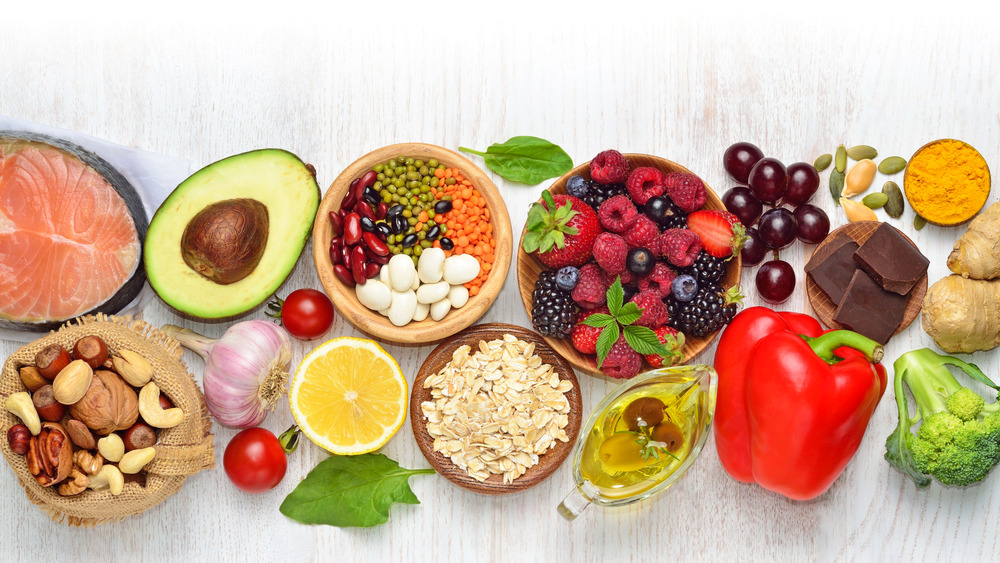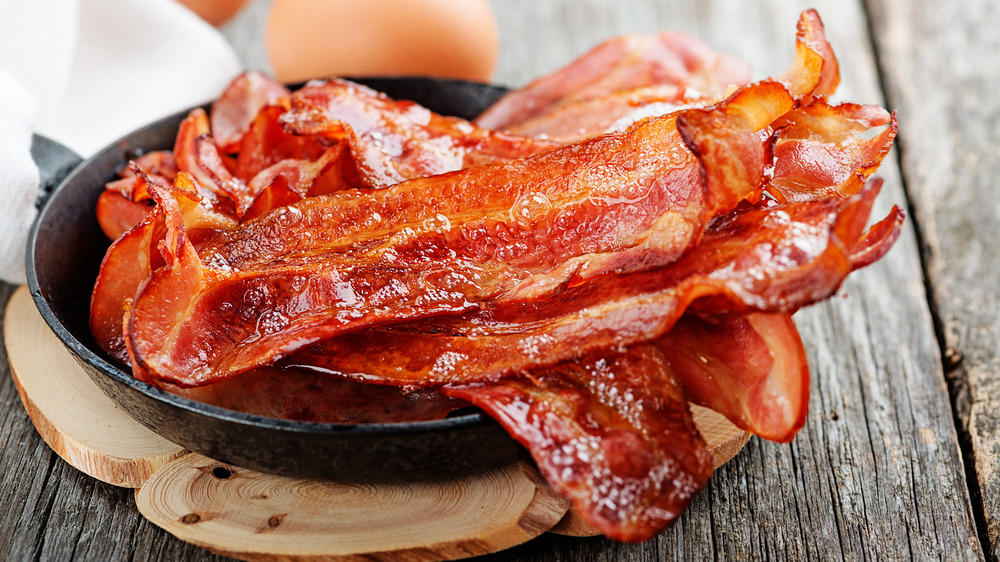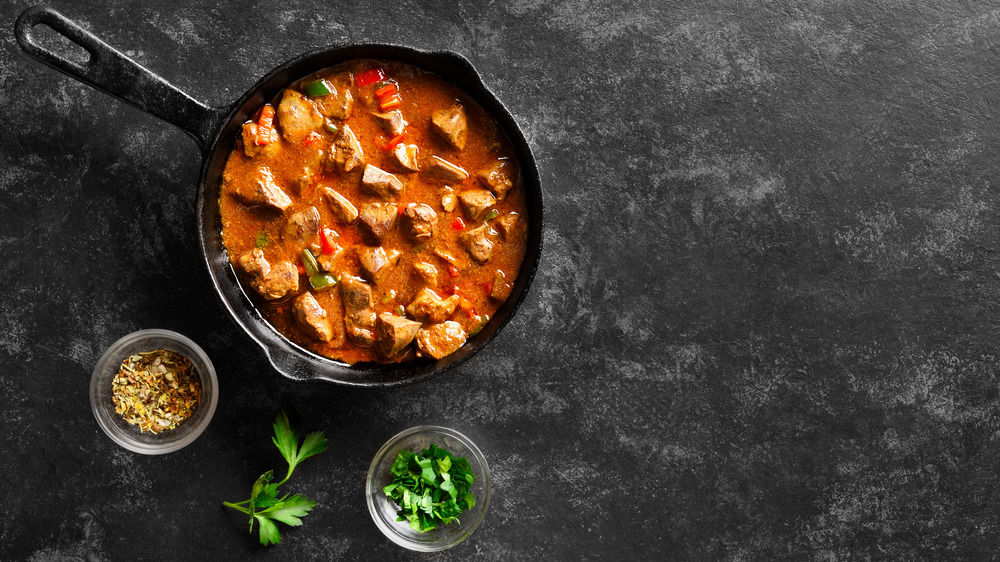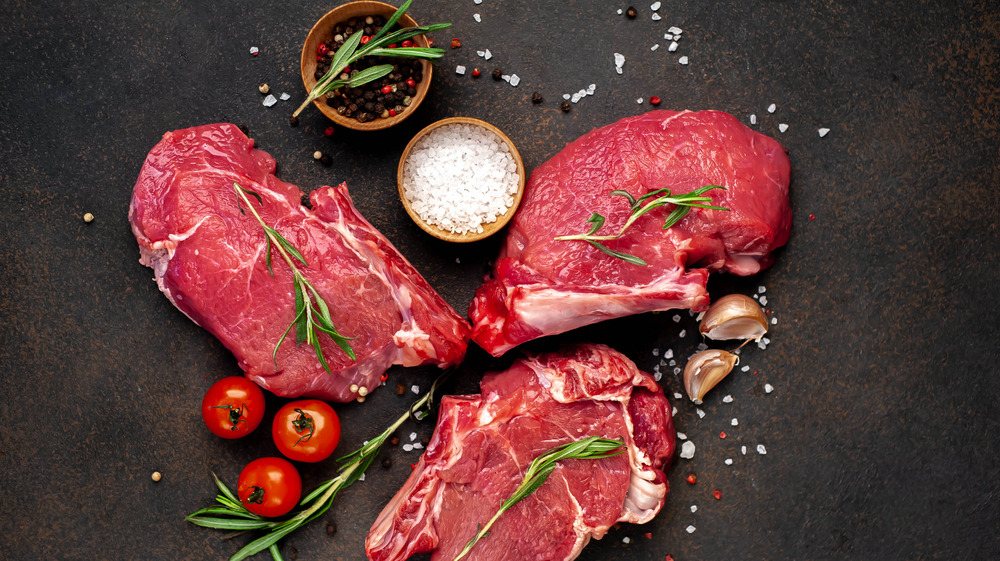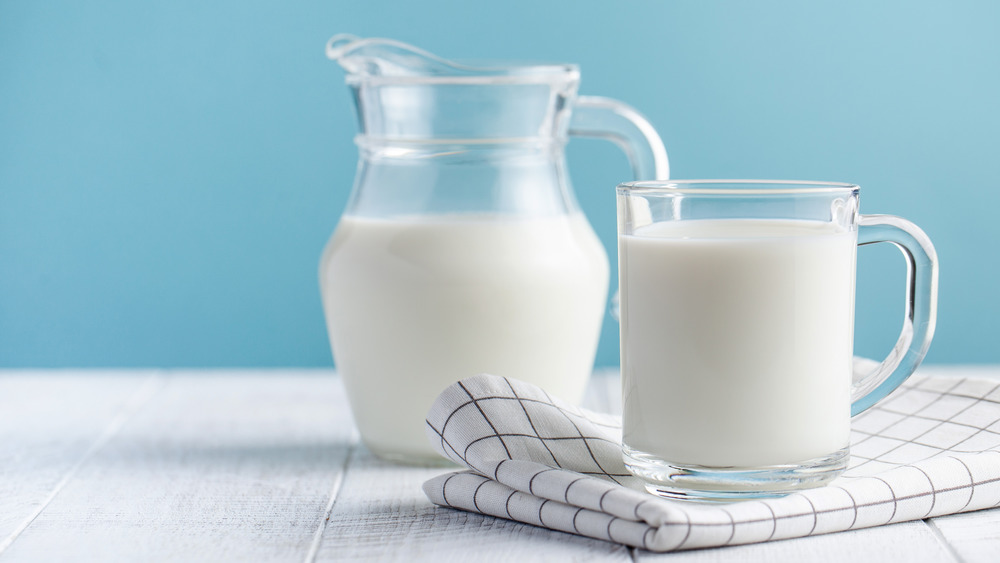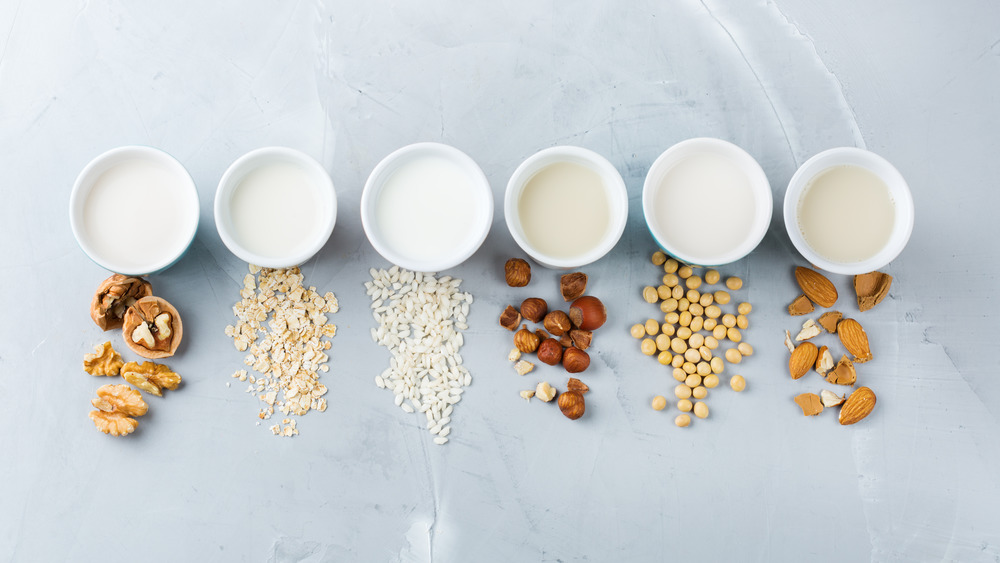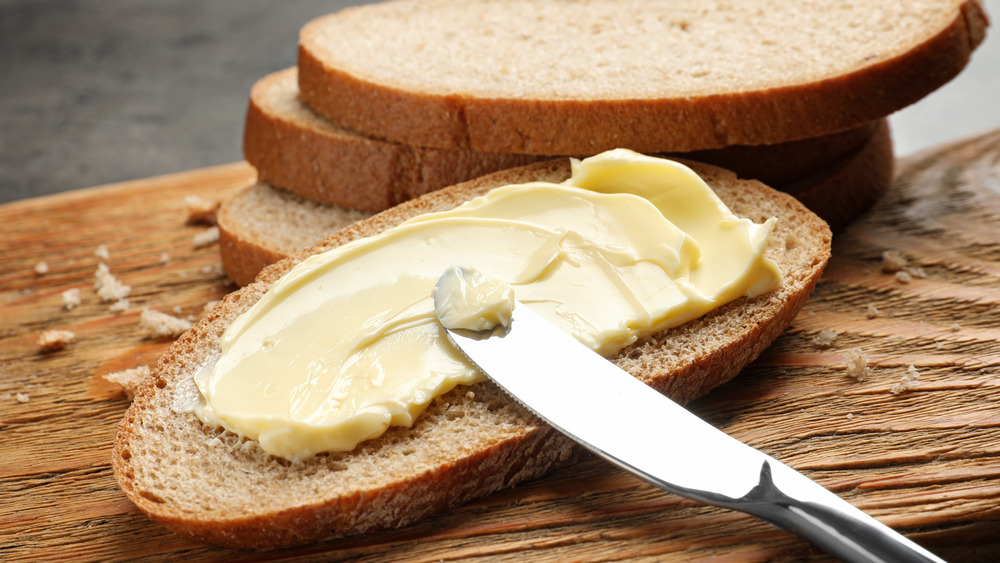7 Foods To Eat And 7 To Avoid For High Cholesterol
Cholesterol is the misunderstood hero of the body. The American Heart Association divides it into two categories: good and bad cholesterol. When people are talking about high cholesterol, they're likely referring to LDL (bad) cholesterol. When there's too much LDL, fat builds up in the arteries creating a series of heart problems.
On the other hand, good cholesterol is called HDL because they are protective against the harmful effects caused by LDL. "It is also used as starting material in the body for making steroid hormones, vitamin D, and bile acids we need for digestion. Without cholesterol, we would not be alive," William W. Li, MD, a physician, scientist, and author of Eat to Beat Disease: The New Science of How Your Body Can Heal Itself tells Health Digest.
A healthy diet involves the right balance of cholesterol. Here's some food to try and foods with high cholesterol to avoid.
It's time to put down the bacon and other processed meats
Who doesn't love the smell of bacon in the morning? While it might sound tempting, your body will thank you for limiting your bacon intake and other processed meats, which comprises of deli meats, sausages, and hot dogs. According to a 2019 study in Nutrients, processed meats — but not eggs or other meats cholesterol — were associated with increased risk in abnormalities of total cholesterol levels.
"Both processed and unprocessed red meats are high in saturated fat and can raise blood cholesterol, which can result in heart disease and diabetes," Nicole Avena, Ph.D., nutrition and health expert and author of Why Diets Fail, tells Health Digest.
One 2017 review in Oncotarget reported a link between processed meats and an increased risk for colorectal cancer. Another review that same year found that the fat and artificial preservatives in processed meat were the reason for heart problems in people who ate processed meat every day. They reported that consuming 50 grams of processed meat a day increased the heart disease risk by 42%.
Instead of red meat, try eating organ meats
Zombies aren't the only creatures that should be eating brains. There are many health benefits to eating animal organ meats such as the kidney, liver, and heart, says Healthline. While our ancestors let no meat go to waste, nowadays, people tend to go for animal meat in the muscles like the thigh or leg. Healthline explains that organ meats are an excellent source of vitamins and nutrients such as folate are beneficial to the human body.
Organ meats are rich in cholesterol, but Healthline says it doesn't seem to affect blood cholesterol levels negatively. A 2017 study also found no link between eating organ meats and an increased risk of heart disease. However, Medical News Today advises that organ meats should be consumed in moderation as it's also associated with saturated fat. Saturated fat increases LDL cholesterol, and should be limited to 5-6 percent of a person's daily calorie intake.
There's also a risk with eating liver, according to Heart UK. While it's also high in cholesterol it does have a wide array of essential vitamins such as Vitamin A but excess Vitamin A can cause its own set of health problems.
The never-ending beef with red meat
One ongoing food fight is the healthiness of red meat. Red meat has essential nutrients, including iron, zinc, and vitamin B12, according to Healthline. Red meat also has creatine and carnosine, important in muscle and brain health.
In 2019, a study published in Annals of Internal Medicine suggested that dietary guidelines had insufficient evidence to support limits on red meat consumption. But before you start grilling those steaks, Nicole Avena, Ph.D., nutrition and health expert and author of Why Diets Fail, tells Health Digest that "consuming red meat increases amounts of LDL cholesterol in the bloodstream and can also increase risk of heart disease."
A February 2020 study in JAMA Internal Medicine refuted the 2019 findings as they found red meat correlated with an increased risk of developing heart disease. Further, a 2012 study found that people who regularly ate red meat died sooner from heart disease and cancer. They also found a shortened lifespan in general for red meat-eaters. And a 2020 study in Current Developments in Nutrition found non-alcoholic fatty liver disease, which is linked to high cholesterol levels, more prevalent in people who ate unprocessed red meat.
Stop drinking so much cow's milk
The milk aisle has changed a lot in the past decade. While cow's milk is still present, there are a lot more non-dairy options packing the shelves. When deciding on milk, the amount of cholesterol should be a massive deterrent in choosing whole milk.
"Whole milk contains saturated fat which can raise your bad LDL cholesterol levels which, over time, can increase your risk of blockages of your arteries," William W. Li, MD, a physician, scientist, and author of Eat to Beat Disease: The New Science of How Your Body Can Heal Itself tells Health Digest.
According to Verywell Health, whole cow's milk has more cholesterol than other dairy products like reduced-fat milk. Whole milk has eight grams of fat per cup and three percent high-fat content compared to the one to two percent of fat found in reduced-fat milk. With this in mind, Verywell Health advises opting for milk products with less saturated fat.
Monitor your cholesterol with other dairy alternatives
Instead of whole milk, try non-dairy alternatives. "Alternatively, you can switch to a plant-based milk like soy milk or almond milk which contains no saturated fat or cholesterol," William W. Li, MD, a physician, scientist, and author of Eat to Beat Disease: The New Science of How Your Body Can Heal Itself tells Health Digest. In addition, Everyday Health says that 25 grams of soy protein can also reduce the risk of heart disease. Almond milk also contains polyunsaturated fatty acids, which lower LDL levels.
Everyday Health also says that hemp milk — derived from the seeds of the cannabis plant but does not have the psychoactive ingredient THC — has no cholesterol and low saturated fat. There are also beneficial nutrients for heart health, including omega-3 fatty acids, calcium, and magnesium, which help maintain a regular heartbeat rhythm.
Everyday Health recommends drinking goat milk if you want a similar flavor profile to whole milk or are lactose intolerant. Although, one cup of goat's milk is high in calories with 6.5 grams of saturated fat and 27 milligrams of cholesterol.
Excessive drinking worsens cholesterol levels
After a long day, you may want to wine down with a glass, but have too much to drink can backfire with more than a hangover. "Alcohol can increase HDL levels (the good cholesterol) if consumed in moderation. Alcohol tends to increase serum triglyceride levels — that's not good," Deborah Murray, MS, professor at Ohio University's College of Health Sciences and Professions tells Health Digest. Indeed, a 2013 review in Current Opinion in Lipidology describes the effects of alcohol as a J-shaped curve where the low amounts of alcohol can lower fats called triglycerides. In contrast, a high intake of alcohol is linked to higher triglyceride levels and an increased risk of cardiovascular disease, alcoholic fatty liver disease, and pancreatitis development.
Ordering a sugary drink can make it harder to toast to good health. "Watch consumption of alcohol such as margaritas and strawberry daiquiris that contain added fat and sodium," Murray tells Health Digest. According to Healthline, high sugar levels found in cocktails increase triglyceride levels.
Fortunately, whiskey, vodka, and gin are good alternatives for someone who wants a cholesterol-free drink. Healthline also says that wine has resveratrol, which is good for heart health and can increase HDL levels — just be careful of that potential wine-induced headache.
People have a right to love avocados
Avocado toast, anyone? There's a reason why everyone's obsessed with the overpriced fad. "Avocados contain healthy monounsaturated fatty acids which are beneficial fats that are heart-healthy, and they are packed with micronutrients that can activate your body's health defenses against chronic disease," William W. Li, MD, a physician, scientist, and author of Eat to Beat Disease: The New Science of How Your Body Can Heal Itself tells Health Digest.
Avocados by themselves have no cholesterol, reports Healthline, but are capable of reducing bad cholesterol. A small 2015 study in the Journal of the American Heart Association reported that people who followed a 5-week avocado diet where they ate avocados daily showed lower LDL cholesterol. Similarly, a 2019 study published in The Journal of Nutrition found that people who are overweight or obese who ate an avocado once a day significantly reduced their elevated LDL levels.
The Mayo Clinic recommends adding avocados to food such as avocado slices on a sandwich, eating them as a side dish, or eating guacamole with raw cut vegetables.
Fast foods are not friendly foods
While treating yourself every once and a while isn't terrible, too much fast food can lead to high cholesterol and a series of other health problems. "Fast foods, especially fried foods, often contain large amounts of saturated fats that can raise your bad LDL cholesterol levels," William W. Li, MD, a physician, scientist, and author of Eat to Beat Disease: The New Science of How Your Body Can Heal Itself tells Health Digest. "In addition, eating a lot of fast food probably means you are not eating a lot of healthier foods containing fiber that improves gut health and lowers cholesterol. "
A 2017 study in Archives of Disease in Childhood found that people who ate fast food when they were children had higher LDL cholesterol, which could increase their risk of obesity and coronary heart disease.
"The high fat content in fast food can contribute to high cholesterol, which can also lead to atherosclerosis. That occurs when plaque builds up in the arteries and prevents the flow of blood to the heart and organs," Jim White, a dietician and owner of Jim White Fitness & Nutrition Studio, told Eat This, Not That!
Seafood is cholesterol's worst enemy
To defeat high cholesterol levels, you need a superfood like seafood. The Mayo Clinic explains that seafood with omega-3 fatty acids does not increase LDL cholesterol but instead reduces blood pressure and the risk of heart attacks. Seafood with the highest levels of omega-3 fatty acids is mackerel, herring, tuna, salmon, and trout. Indeed, a 2017 study published in Public Health Nutrition found that at least one serving of fish per week reduced the risk of dying from coronary heart disease.
The American Heart Association recommends a 3.5-ounce serving of fish or a three-fourth cup of flaked fish at least twice a week. This recommendation applies to fatty fish like salmon that have high omega-3 fatty acids.
If you can't stomach the taste of fish, fish oil supplements help with the same effects when taken daily. But it's not as good as chowing down on a tuna sandwich. "You can supplement with fish oil, but be careful because very high doses of pure fish oil can lower your triglyceride levels ... and increase your good cholesterol," Leslie Cho, MD, a preventative cardiologist told the Cleveland Clinic. "It doesn't lower your LDL, though. Be sure to read your fish oil supplement label."
Shrimp isn't so bad when eaten in moderation
Shrimp may be low in fat, but they're packed with cholesterol. Healthline explains that 3.5 ounces of shrimp are 200 mg of cholesterol — a small serving that almost reaches the recommended daily cholesterol intake. According to Medical News Today, the high cholesterol levels once had doctors recommend against eating it. However, a 1996 study in The American Journal of Clinical Nutrition debunked this claim. They found adding shrimp to a low-fat diet increased more of the HDL cholesterol than the LDL cholesterol.
Indeed, a 2013 review in Current Science reported that when considering all the other nutrients shrimp provides — proteins, trace minerals, and carotenoids —shrimp is healthy food to eat.
Nicole Avena, Ph.D., nutrition and health expert and author of Why Diets Fail, tells Health Digest that eating shrimp isn't so bad when eaten in moderation. "Shrimp, while it is high in LDL cholesterol, also helps to raise the good HDL cholesterol so that the ratio between the two types in the body is still balanced."
Coffee can increase cholesterol levels
America runs on coffee — whether it's Dunkin Donuts coffee or not. A survey by Reuters reported that 64% of Americans drink coffee every day. There are many benefits to coffee, and Deborah Murray, MS, a professor at Ohio University's College of Health Sciences and Professions, tells Health Digest that the polyphenols found in coffee are protective against heart disease and cancer. However, a 2018 study in the journal Heart also found higher LDL levels in daily coffee drinkers.
"There are certain types of coffee where the low-density lipoprotein (LDL) cholesterol levels may be a little higher like French press coffee, Turkish coffee and espresso," Dennis Bruemmer, MD, Ph.D., a cardiologist, told the Cleveland Clinic. In addition, the Cleveland Clinic says that the sugar in coffee drinks like frappuccinos also raises cholesterol levels. "Now we're not talking coffee anymore. We're talking about cream and caramel, things high in sugar. They're consumed as a full meal and have 50 grams or more of sugar. Once you consider the cream and even the size you're talking about 600 calories, over a quarter of your daily calories right there. It's completely out of proportion to what moderation would be considered."
Choose margarine over butter for a healthy heart
When it comes to matters of the heart, choose margarine over butter. "Margarine that is made with a liquid vegetable oil — could be sunflower, corn, soybean oil — as long as the oil has not been hydrogenated it will be heart healthy," Deborah Murray, MS, professor at Ohio University's College of Health Sciences and Professions, tells Health Digest.
The Mayo Clinic says that the fats in margarine help to lower LDL cholesterol levels. However, the type of margarine matters too. Solid margarine has more trans fat. Trans fat lowers HDL "good" cholesterol levels. For this reason, margarine from a tub is healthier than stick margarine.
Unlike margarine, butter is derived from animal fat, which indicates more saturated fat. "Sure, butter is creamy and spreadable, but it provides a significant source of saturated fat which in excess can lead to elevated blood cholesterol," Julia Zumpano, a preventive cardiology dietitian, told the Cleveland Clinic.
Duck away from the duck
While chicken and turkey have low cholesterol, says WebMD, ducks don't seem to fit into that category. One cup of cooked duck contains approximately 128 milligrams of cholesterol."Excessive intake of red meat will drive up LDL levels (the bad blood cholesterol), the fattier the red meat, the more it will increase heart disease risk," Deborah Murray, MS, professor at Ohio University's College of Health Sciences and Professions tells Health Digest.
Another article in WebMD explains that duck meat has monosaturated and polyunsaturated fats that help reduce LDL cholesterol. But there are also saturated fats that increase LDL cholesterol much more than other healthy fats.
Duck eggs are also concerning for people watching their cholesterol. A 2012 study published in the Journal of Veterinary and Animal Sciences found that cholesterol levels were higher in duck eggs than chicken eggs. Since game is typically lean, Murray recommends eating the duck without the skin for a healthier meal.
There's nothing devilish about deviled eggs
Eggs have cholesterol, but their nutritional value outweighs any cons against eating them. According to Harvard Health Publishing, eating a chicken egg a day won't increase the risk for stroke or other cardiovascular diseases. This changes when other ingredients that raise cholesterol levels are added, such as butter, cheese, bacon, sausage, muffins, or scones.
Nicole Avena, Ph.D., nutrition and health expert and author of Why Diets Fail, tells Health Digest that since eggs still increase LDL levels in the body, it can be harmful to people with preexisting health conditions. "For those with diabetes or who are at risk for heart disease, they should limit their egg consumption to three per week."
"For most people, they can eat eggs in moderate amounts and experience no deterioration of their health," Avena told Health Digest. The Mayo Clinic says that healthy people who eat seven eggs a week don't seem to have an increased heart disease risk. If you're watching your cholesterol intake, the Mayo Clinic recommends using egg whites since egg yolk has the most cholesterol in an egg, where it stands at 186 mg.

